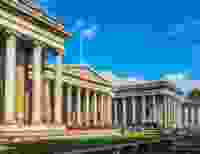
Living with our past
Living in a democracy means respecting and being tolerant of other's views. Today none of us are tolerant of slavery, but we can be tolerant of each other's approach to history, argues John Redwood MP
The past is another country. We are linked to it by past members of our families, by the buildings and works of art they left us, and by the language, heritage, culture and institutions they helped fashion. We can enjoy the best of their inheritance, and change those parts of it we do not like or approve. The works and deeds of those who came before cannot be undone, just looked at in different ways. We have the precious gift of life, which means we can help shape the world around us, the world we will pass on to our children in due course. The dead can no longer change our world from the grave. Their believers and helpers who are alive can join our democratic process as we battle over their legacies.
I am glad I live in a country which usually respects the past whilst having sometimes passionate debates about it. I remember taking a Russian visitor around the Palace of Westminster shortly after the Berlin Wall was torn down. After I had described a few of the characters portrayed in pictures and statues he grasped a fundamental truth. He said how lucky I was to live in a country that could live at ease with its past. His country had been one where each successive tyrant who grabbed power rewrote the history as he wished and ordered the tearing down of pictures and statues of those who no longer pleased.
Each generation has difficult decisions to make about the built and artistic inheritance. I think it is right to conserve sufficient of the past so all interested can see examples of the buildings for themselves, and can find likenesses of the leading figures that helped shape the UK of their day, for better or worse. I have never thought I should with like minded people be able to win an election and then purge our cities and galleries of memorials to those we oppose. My disliking Marx cannot change the historic importance his thinking has enjoyed, nor wipe out the millions of deaths carried through in the USSR and elsewhere by following his ideology. I fought my battles against Marxist social and economic thinking with my pen as a young man. I never suggested defenestrating his statues.
In the UK we have proceeded by evolution rather than revolution most of the time. The English Church or house evolves, with extensions and new facilities added as the generations pass. So it should be with our approach to the built environment. There are times when adapting what we inherit makes sense. There are times when need and commercial logic points to replacement, building anew. Then should we record and photograph what is lost, so those interested will in future know how we changed the world.
Towns and cities with statues on public ground have democratic processes to decide whether to maintain or replace them. Where a City no longer wishes to remember in open space a former leader who gave money or ran parts of public and commercial life the statue could be moved to a private place that did wish to remember, or to a museum where it can form part of an historical display and account.
I share the hatred of many of slavery and enforced occupation of a country by a military power. I have always resented the way the Romans invaded our country, placed it under a brutal military control, and made a market in slaves to give the senior Romans a wonderful lifestyle. It has not made me want to remove all the Roman statues of the thinkers and leaders of the imperial and colonial government which enforced this system on us. I do not deny that alongside their belief in slavery and military rule they also produced some important academic work and technology. The Romans who delighted in the torture and cruel death of animals for sport were good at building large structures. We can debate what if anything they did for us without throwing their statues into the nearest river or sea.
Living in a democracy means respecting and being tolerant of other's views. Today none of us are tolerant of slavery, but we can be tolerant of each other's approach to history. The academics who are often most engaged against the statues of former donors today often depend on donations and fees from China. Are they sure their own deeds are as morally pure as they think those of the past should have been? How do they rate China for civil liberties, freedom of expression and of religion?

John Redwood is a former Conservative MP for Wokingham and a former Secretary of State for Wales. For more on UK tech and innovation policy, read Sean Kohli on why Britain must back its founders to win the AI race.









